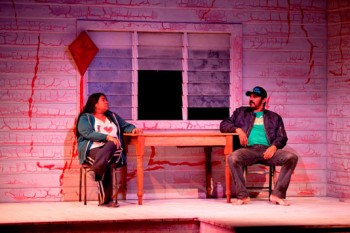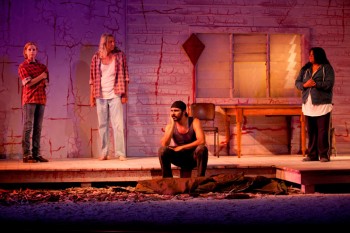Signs of Life – poetically pragmatic
There is something quietly disquieting about the set. It's simplistic yet beautiful — a room in a farmhouse jutting out from a corner, the rest of the stage the property.

A tree cut out from the backdrop and backlit to fit the scene. Reddish-brown highlights; the colour of bushland. Leaves and other detritus littering the ground. Somehow it's so perfectly evocative of Tim Winton's writing: the grit of Australian landscape. Zoe Atkinson with her design opens up the world for us; light through a window (beginning consistently excellent lighting design by Jon Buswell) slowly illuminates the solitary Georgie as she sits, and we begin.
Signs of life is a Black Swan transplant from Western Australia currently taking up residence in one of the better intimate venues in Sydney, the Drama Theatre at the Sydney Opera House. It's fitting, because Signs of Life is all about transplants. There's Georgie (A bruised and carefully warm Heather Mitchell), who comes from Winton's 2001 novel Dirt Music (Booker prize shortlist; Miles Franklin winner). Her connection with Luther Fox (still overwhelmingly present in George Shevtsov) here takes a delicate backseat to a new story of two unexpected visitors to her remote home, the rough-as-guts Bender (Aaron Pedersen, wholly captivating) and his troubled big sister Mona (remarkably complex and lovingly real in a standout performance by Pauline Whyman).

Heather Mitchell, George Shevtsov, Aaron Pedersen and Pauline Whyman in Signs of Life. Image by Lisa Tomasetti 2012
Signs of Life is about searching for a sense of place, one of the great thematic explorations of the Australian literary and theatrical canon. Post-colonial, post-Invasion, post-everything, backdropped by a drought (“It doesn't rain anymore,” almost every character remarks), there's an ingrained, gentle desolation to each person here.
Georgie, dealing with her own loss, reluctantly takes in the stranded sibling pair, whose losses range from horrific to helpless; a product of stolen generations, assimilation, and systemic alcoholism. They are displaced, or lost, and all are (including Georgie) in some way, hurting. When each character's stories are revealed, the levels of grief, the brushes with death, their pain is palpable; it really works.
Yet this is not, on the whole, a depressing affair. Winton's realism and Kate Cherry’s deft direction intertwine hope with wry humour; there are plenty of laughs, even moments of joy, which commingle so naturally with fear and despair. Culture clashes fade into the shared human experience.
[pull_left]Signs of life is poetically pragmatic; the lyricism of the language is grounded in a refreshing realism[/pull_left]
Signs of life is poetically pragmatic; the lyricism of the language is grounded in a refreshing realism. Nothing about this play is overwrought, blessedly, because in the hands of a lesser team it just might have been. Pedersen, Mitchell, and Whyman keep the play firmly grounded, earthy even while the language floats a little too high. Shevtsov's Luther, representing a sense of the empyrean, looms larger than expected and perhaps warranted, but it doesn't touch the magic of the central three characters.
Composer and sound designer Ben Collins creates harmony with the language and surrounds and you couldn't expect anything less, because Winton and music are inextricable, from language to a wildly successful book soundtrack (Dirt Music; unequivocally Australian).
This is a fully realised production that encourages sensory engagement without being overbearing. Ash falls from the sky like a post-bushfire benediction, and the fire casts reddened light over the scene. Pinkish sunsets, clearer morning skies; the time passes in such a way that the play lives and breathes around the characters, pulsating on its own — just like Winton, where the people and the land co-exist, each with their own stories.


or, for an alternate opinion: boring. forced. tryhard.
but on the bright side it was only one act.